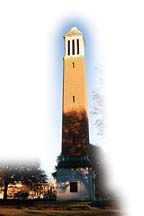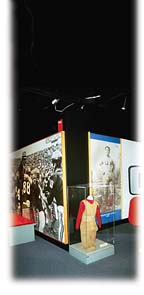Protecting Prized Possessions

Allowing easy access to extensive campus facilities while protecting both people and the university’s many physical assets required a robust, integrated, intelligent security system. The system had to be complex enough to provide varying levels of security where needed, yet easy to use. Tying together the university’s many security systems was a must.
Several thefts within the School of Arts and Science and the School of Business spurred us to take the initial first step of installing a large security video system on campus. Proposed was a GE digital system. Barry Komisar, president of Vision Southeast and a University of Alabama graduate, bid on the job and ultimately won the contract to install the first of many GE systems on campus. There now are alarmed recorders that can be viewed throughout campus over a fiber optic network system.
With upgrades of certain aspects of the security program, new technology was accommodated as well. Managed are security functions via a single graphical user interface and a relational database. The design integrates and manages digital video surveillance, intrusion alarm systems and the GE Secure Perfect access control system in the Athletics Building.

An existing access control system is based on magnetic stripe cards mainly used as debit cards on campus by students, faculty and staff. A few of the cards are currently used for access control and more will be employed for access to a new athletic facility once it is open. The plan: to move to a dual technology where one card lets the university use the magnetic stripe for debit and proximity for access control.
Eventually the facility will have one centralized area within the university police department to manage all security systems, with every campus building accessible through the network. An IP address is set up on a PC and then the user can access the cameras at any time. In addition, each building manager and police investigator is able to access the cameras using a password on the network.
Sports are a very important part of the University of Alabama’s history. The Paul W. Bryant Museum on campus is devoted to the memory of this famous football coach, nicknamed the "Bear," with extremely valuable awards, trophies and memorabilia on display, including the crystal football, an NCAA championship trophy.

Action at museums
Security cameras are trained on the football and it is alarmed. Several times, the alarm has gone off and when a museum assistant went to check, no one was there. At first, staff thought there was something wrong with the equipment. When video playback was reviewed, however, someone was, in fact, touching the football but left before the museum assistant or the police could catch them.In another area, the Special Collections Library contains singular and valuable items including artwork and historical letters. Students and individuals can request to view a collection hands-on, but items cannot leave the premises.
There was an incident where an individual was looking at a rare collection of letters by a famous writer of American folk songs from the 1800s. When the individual was finished looking at the letters, he put them back in their envelopes and returned the envelopes. Not long after, the letters were for sale on the online auction site eBay. The individual was apprehended and he said he did it just to see if he could.
Now, security video covers all six tables, the entry and exit in the Special Collections library. Also installed is a DVR with one terabyte of storage to view recorded video months or even years from now.
There are cameras at the Bryant-Denny Stadium, the on-campus home of the Alabama Crimson Tide football team. The stadium’s total seating capacity is 83,818. Cameras are just below the scoreboard. With them, security can view the entire stadium as it’s filling up. This powerful, versatile camera is a purely promotional tool for pre-game television and Internet coverage – it’s blacked out once the game starts.

Moving forward
The university is in the process of installing eight cameras and eight card readers at Bryant-Denny Stadium, where expansion is a two-phase project that will increase the size of the stadium and its capacity greatly. There is also a major renovation project of the basketball venue, Coleman Coliseum. In addition, security has added security video to three academic and student center buildings. Secure Perfect will integrate the access control and security video functions for all of these buildings.The new athletic facility is expected to be complete in December and will incorporate many state-of-the-art security features. Football head coach Mike Schula came from the NFL and he is very security conscious. Ultimately, security chose GE’s Secure Perfect access control and security management software. Offered on the Windows platform, Secure Perfect met current needs and could clearly grow into the future. The system integrates all disparate and legacy security programs into one system that is easy to configure and operate.
Currently buildings are locked down at night; and student workers open them in the morning and lock them during after-hours. Security wants to change that to a more automated access control system. The university’s goal ultimately is to secure the perimeter of every building.
The cameras are easy to operate, with color images that can be faxed, e-mailed, copied and distributed. Police investigators appreciate that they don’t have to hassle with the different time-lapse VHS formats and the clunky storage issues associated with VHS tapes.
Looking for a reprint of this article?
From high-res PDFs to custom plaques, order your copy today!




